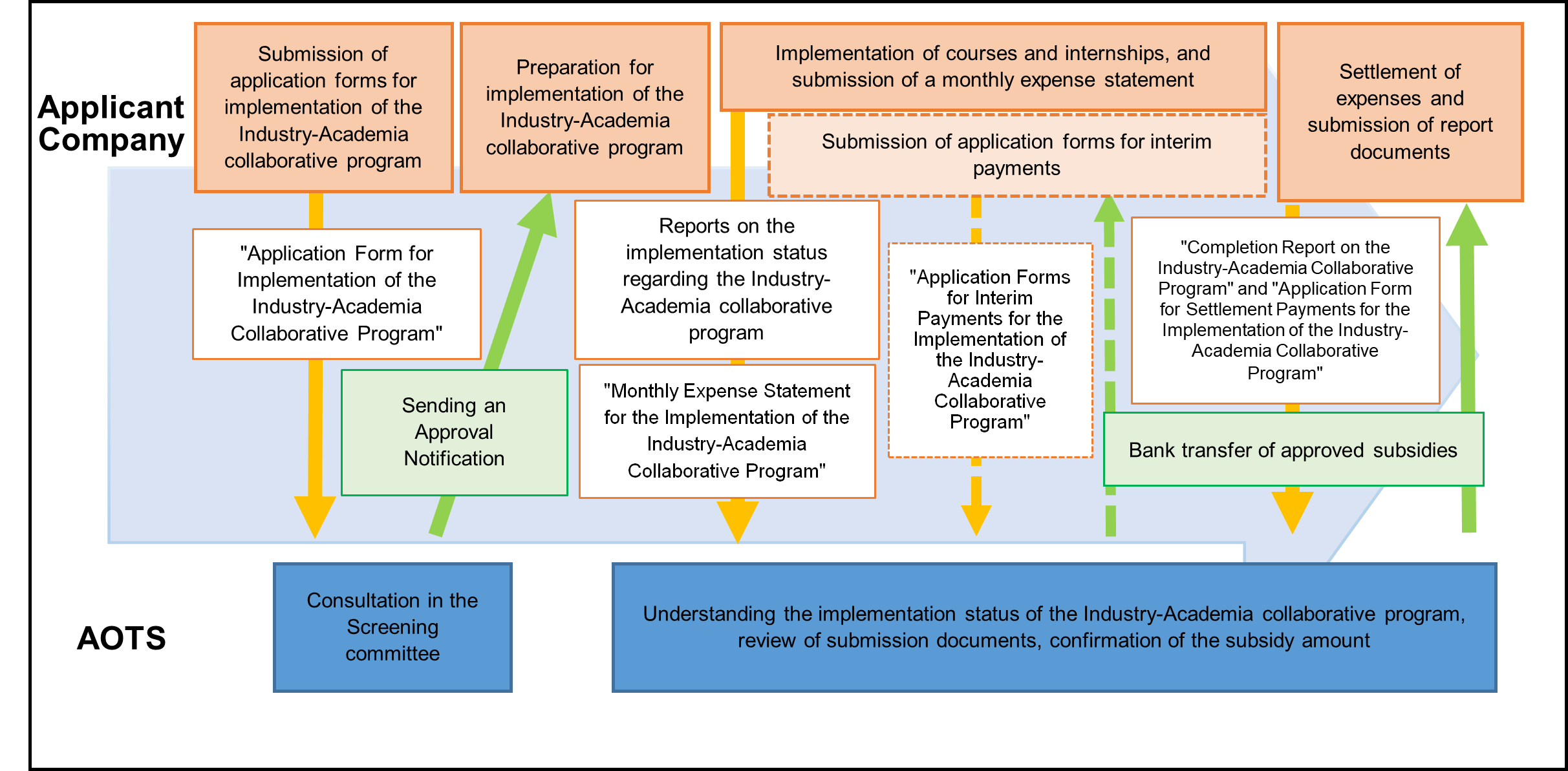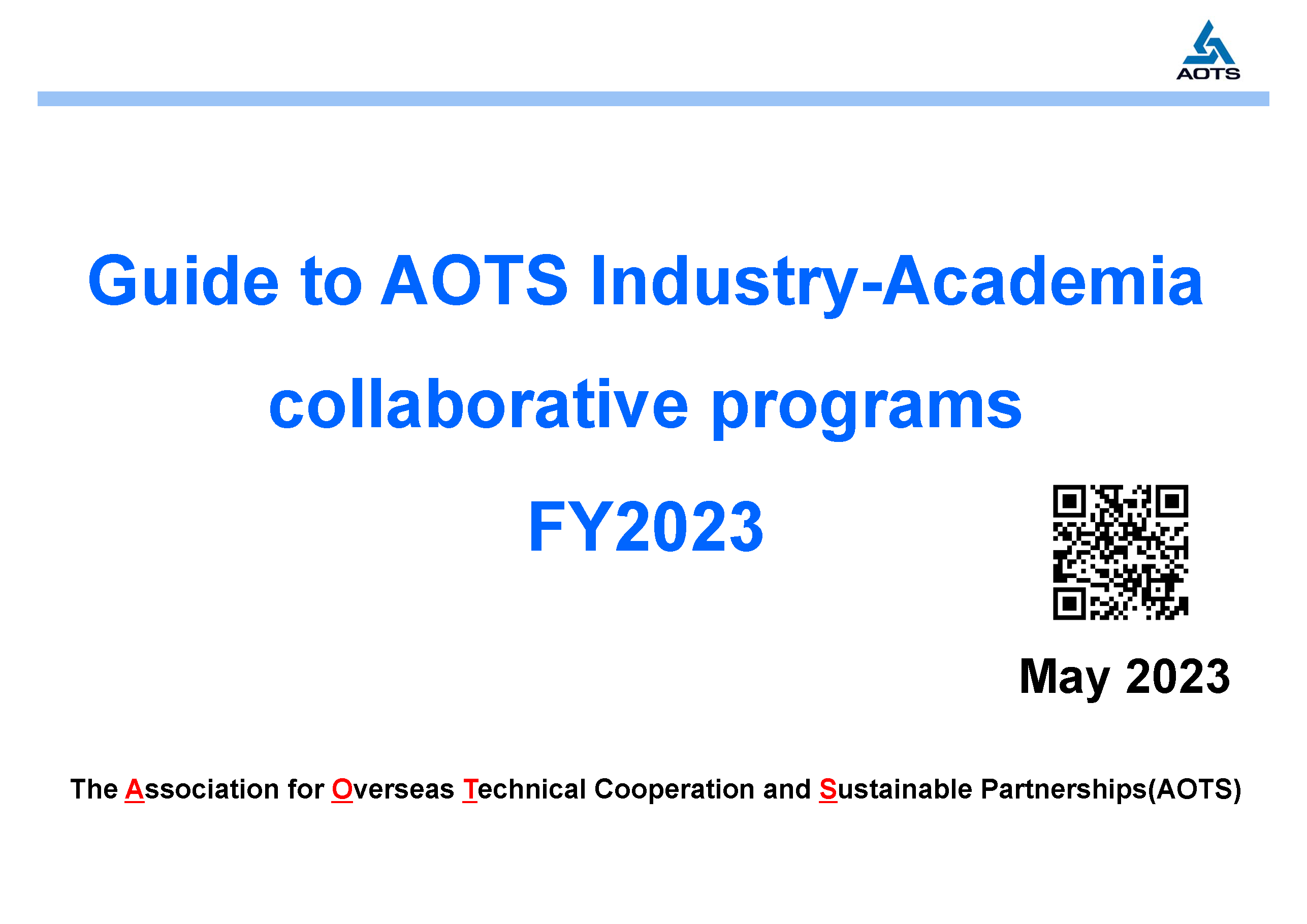2023 Guide to AOTS Industry-Academia collaborative Programs (English)
Outline
The Industry-Academia collaborative program is an industrial human resource development program, which is realized through the establishment of courses (special courses) at universities in developing countries as well as in Japan, by providing internships (working experience) to students from developing countries by cooperating with Japanese companies, local Japan-affiliated companies, and so forth.
The purpose of this program is to improve the knowledge and skills of students that are desired by the Japanese companies and the local Japan-affiliated companies through the courses and internships, together with increasing their motivation to seek employment at those companies. By leading students to such workplaces, this program aims to contribute to the facilitation of those companies' business activities and the establishment of stronger ties between Japan and the relevant countries .
Japanese government subsidies are applied for part of the expenses needed to implement the Industry-Academia collaborative programs.
Requirements of Applicant Companies
For Japanese companies or local Japan-affiliated companies ("applicant companies") who wish to provide the Industry-Academia collaborative programs and apply for subsidy, the requirements are as follows:
- Companies and organizations with corporate status in Japan (with more than 50% Japanese ownership), or local Japan-affiliated corporations in which such companies and organizations have invested more than 50% of equity or representative offices of such companies and organizations.
Regarding Japan-affiliated companies which are located in the regions or belonging to the business field where foreign investment is regulated less than 50%, in case their investment ratio of Japanese companies/people amounts to the upper limit, and they are dealing with the Japanese products and services, there are possibilities that such companies will be approved as the applicant companies.More than two companies form a consortium, and one of them can apply this programs as an representative.
- Those belong to a group of companies that have capital relationships with each other and in which there is a member company planning to recruit students, who are nationals of developing countries and regions, from local universities or universities in Japan eligible for the Industry-Academia collaborative programs.
Recruitment agencies or dispatch work agencies can also apply this program.
Please consult with us for details. - Those with the abilities to implement and manage courses and internships and to pay associated costs
- Those able to arrange companies and organizations to assist with preparation and implementation of Industry-Academia collaborative programs in the countries and regions where they are conducted, as necessary
Activities to be Implemented by Applicant Companies
The following activities shall be implemented by the applicant companies.
- In cooperation with local universities or universities in Japan, carrying out required procedures for the establishment of the Industry-Academia collaborative programs, such as designing the program's subjects and scheduling.
- Creating a program curriculum in accordance with the applicant companies' desired knowledge and skills, selecting/requesting lecturers, and creating a syllabus as well as materials, etc.
- Procuring and managing the proper use or maintenance of the materials and equipment only when AOTS specifically acknowledges that they will enhance the effectiveness of guidance in the program.
- Coordinating with local universities or universities in Japan for the program, including setting time slots for lectures, and so forth, recruiting students to take the program, and requesting for attendance management of the students.
- Coordinating with local universities or universities in Japan for implementation and how to operate the program and providing support to carry out the program without any delays.
- As necessary, planning and implementing internships at applicant companies for students who were selected among the participants. If an applicant company is not appropriate for carrying out an internship, it shall be able to carry out the internship in cooperation with business-related companies. When doing so, the applicant company shall decide the timing, number of students, period, content, and the person in charge in consultation with the company which accepted the internship.
- When an internship is to be carried out, providing guidance for applicable students in advance regarding the internship plan, and appropriately managing their health and safety.
- Reporting on progress of program implementation during the period of the Industry-Academia collaborative programs, summarizing completion reports, and reporting as well as settling expenses.
- Other matters which are required for implementation and management regarding the establishment of the Industry-Academia collaborative programs.
Requirements of the Industry-Academia Collaborative Programs
Configuration and overview
In cooperation with local universities or universities in Japan, applicants companies implement courses and internships. However, carrying out internships shall not be mandatory. Applicant companies may choose to or not to implement internships according to their plan.
Applicant companies are requested to arrange the program that will motivate students to work and will lead to their employment at Japanese and local Japan-affiliated companies.
Courses
- Structure: Lectures, seminars, exercises, practical training / experiments, research, etc. which are carried out at participating universities
- Total course hours: 450 minutes or longer (ex.: 90 minutes x 5 sessions)
- Number of participants: 5 or more
Internship (optional)
-
Overview: Work experience, carried out at the applicant companies or relevant companies for all or some the students attending the courses
-
Duration: 2 days or more
Details of the Industry-Academia collaborative programs
Course content will include the following subjects, to contribute to learning and improving abilities in the knowledge and technologies that Japanese and Japan-affiliated companies demand when hiring human resources overseas and lead to employment of students at Japanese and Japan-affiliated companies:
1. Details on key technical fields directly related to corporate activities as well as required technologies in acquiring the key technical fields
(Example) Automation, AI, IoT, robotics, information security, big data processing, next-generation automotive-related, mechatronics, digital manufacturing technology, carbon recycling, clean energy, optical and quantum technology, biotechnology, nanotechnology and materials, and expertise which will contribute to the business activities as well as industrial development of other fields
2. Details related to recruitment for projects that contribute to technology transfer for industrial development in developing countries and regions
Please consult with us regarding specific subject fields.
In addition to 1 or 2 above, the program may also include content to encourage employment with Japanese and Japan-affiliated companies
(Example) Introductions to companies and products, advantages of employment with Japanese and Japan-affiliated companies (career development, advantages in treatment), language skills for communication after employment
The technical fields mentioned above 1. or 2. should account for more than half of the total course hours.
Countries where the program is implemented
Developing countries and regions or Japan
Universities and Institutions which are applicable for the establishment of the Industry-Academia collaborative programs
Local universities and institutions in developing countries or universities in Japan that are applicable for the establishment of the Industry-Academia collaborative program shall be higher educational institutions that meet the following requirements:
- Schools and other educational institutions providing education in the technical fields which are mentioned above, 1. and 2. of the Details of the Industry-Academia collaborative programs, to students who are nationalities of developing countries and regions.
- Schools and other educational institutions that have established and operate programs awarding degrees of the level of “Associate Degree” or “Foundation Degree”, or higher
- Schools and other educational institutions that graduate students who can be expected to play active role at Japanese companies or local Japan-affiliated companies
Qualifications of students
Students must meet the following requirements:
- Students who are and were enrolled in local universities, or in universities in Japan that are applicable for the establishment of the Industry-Academia collaborative programs
Please consult with us if applicant companies include graduates for a target.
- Students who are nationals of developing countries and regions
- In principle, students who are 18 years old or older
- Students who do not belong to the military
Course teaching method
-
Lecturers in charge of the courses shall be external experts, specialists, employees of the applicant companies, and faculty members of universities which establish the Industry-Academia collaborative programs. In addition, the lecturers can carry out the courses using an interpreter.
-
In principle, the lectures and exercises of the courses shall be carried out within those universities, but may include activities at external facilities, or practical training / experiments at companies if necessary.
- The courses can be carried out as online lessons, using ICT tools and digital devices through the Internet.
Internships (optional)
-
Internships shall be to help students learn about the excellent technology and know-how of Japanese companies, to experience Japanese culture/life, advanced social infrastructure, and workplace environments, etc., and to encourage students to work for Japanese companies or local Japan-affiliated companies through practical work experience.
-
The host companies are applicant companies in Japan or abroad with Japanese affiliation, or local companies that have capital and trading relationships and technical partnerships with the applicant companies. The selection of the host companies needs to be approved by the screening process.
-
In the host company, adequate management and systems for interns shall be set, including the arrangement of a mentor, support for interns' daily lives, arrangement of supplies and equipment, etc. which are necessary for the internship, and arrangement of an interpreter to help interns carry out the work experience in a language which they can understand.
-
If the host company for the internship is not located in the same country as the university, such as being in Japan, the applicant company shall carry out necessary procedures for the interns' entry into the country and stay, such as for the acquisition of visas, etc., and shall comply with the laws of the country and AOTS standards for internships and treatment, etc. of interns.
-
If carrying out direct guidance at the company which accepted the internship is considered to be not appropriate due to the effects of special circumstances, such as the novel coronavirus pandemic, the company can remotely provide a practical alternative program using ICT tools, and it shall be treated as an internship after obtaining approval from the university, etc. which establishes the Industry-Academia collaborative programs.
Share of Expenses for Implementing the Program
Japanese government subsidy shall be applied to two-thirds of the expenses for the establishment of the Industry-Academia collaborative program (settlement amount) which was approved by AOTS as expenses eligible for the government subsidy.
Applicant companies shall be responsible for one-third of the expenses for the establishment of the Industry-Academia collaborative program (settlement amount) and 10% of the expenses for establishing the program (settlement amount) as the equivalent administrative expenses (the expenses that applicant companies shall be responsible for is referred to as "Share of expenses").
Expenses that are applicable for government subsidy (settlement amount) after deducting the share of expenses shall be paid.
If more than two companies form a consortium, AOTS will settle the accounts with the representative.
Expenses that are Applicable for Government Subsidy
Expenses for the implementation of the Industry-Academia collaborative program
1. Expenses for the Implementation of Courses
(1) Remuneration for Program Advisor
(2) Technical Guidance Fee for Lecturer
(3) Expenses for Teaching Materials
(4) Travel Expenses for Lecturers and Interpreters
(5) Interpretation Fee for Classes
(6) Rent Expenses on Educational Facilities and Equipment
(7) Expenses for Devices and Equipment
(8) Expenses of Devices, Equipment and Environmental Setting necessary for On-line Guidance
(9) Other Expenses for Course Implementation
(10) Travel Expenses for International Students in Japan
2. Expenses for the Implementation of Internships
(1) Travel Expenses for Participants of Internship
(2) Interpretation Fee for Internship
(3) Outsourcing Expenses of Digitalized Materials Development for On-line Internship
(4) Expenses of Devices, Equipment and Environmental Setting necessary for On-line Internship
(5) Other Expenses for Internship Implementation
3. Expenses for Support on Introduction and Implementation of On-line Guidance
4. Honorarium for Cooperation to the School Establishing the Course
5. Administrative Travel Expenses for Preparation and Implementation of Program
6. Outsourcing Expenses
Flow of Program Implementation

Inquiry
Endowed Program Group, Corporate Liaison Department
TEL: +81-(0)3-3888-8238 FAX: +81-(0)3-3888-8428
![The Association for Overseas Technical Cooperation and Sustainable Partnerships [AOTS]](/application/files/7615/7242/3141/logo-en.png)
